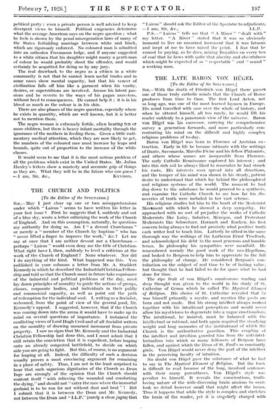THE CHURCH AND POLITICS
[To the Editor of the SPECTATOR.] SIR,—May I just clear up one or two misapprehensions under which " Laicus " seems to have written his letter in your last issue ? First he suggests that I, suddenly and out of a blue sky, wrote a letter criticizing the work of the Church of England. And on this assumption, naturally, he questions my authority for doing so. Am I "a devout Churchman" or merely a "member of the Church by baptism" who has "never lifted a finger to improve the work," &c. ? Let me say at once that I am neither devout nor a Churchman— perhaps " Laicus " would even deny me the title of Christian. What right have I, then, suddenly to level a criticism at the work of the Church of England ? None whatever. Nor did I do anything of the kind. 'What happened was this. You published in your columns a letter from Mr. A. Studdert Kennedy in which he described the Industrial Christian Fellow- ship and told us that the Church must in future take cognisance of the industrial and political problems of the day, must lay down principles of morality to guide the actions of groups, classes, corporate bodies, and individuals in their public and commercial capacity, as well as point out the path of redemption for the individual soul. I, writing as a Socialist, welcomed, from the point of view of the general good, Mr. Kennedy's appeal. I suggested, however, that if the Church was coming down into the arena it would have to make up its mind on several questions of importance. I instanced the conflicting views of Lord Hugh Cecil and of all Socialist writers on the morality of drawing unearned increment from private property. I saw no signs that Mr. Kennedy and the Industrial Christian Fellowship had done this, and I must admit that I still retain the conviction that it is expedient, before leaping onto an already congested battlefield, to decide on which side you are going to fight. But this, of course, is no argument for leaping at all. Indeed, the difficulty of such a decision usually proves a most convincing argument for remaining in a place of safety. Thus, I am not in the least surprised to hear that such sagacious dignitaries of the Church as Dean Inge are strongly of the opinion that the Church should content itself "with relieving the wounded and comforting the dying," and should not "enter the race where the immortal garland is to be run for not without dust and heat " ! But I submit that it is between the Dean and Mr. Kennedy, not between the Dean and "I.L.P." (surely a chose jugie) that "'Aims" should ask the Editor of the Spectator to adjudicate.
P.S.—" Laicus " tells me that " A Miner" "dealt with" my letter. "A Miner" stated that it was so obviously immoral to live on unearned increment that it was fatuous and inept of me to have raised the point. I fear that he cannot he paying, as he does, mining Royalties on every ton of coal that he hews with quite that alacrity and cheerfulness which might be expected of so " respectable " and " sound" a working man.










































 Previous page
Previous page